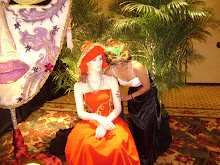Over the past weeks I have been watching
America’s Got Talent – a show where people from all backgrounds and talents take a shot at becoming the next big performer in Las Vegas. I do not watch this show solely for the entertainment, but rather to see how talent is discovered, and once given a chance to move forward, how those talents develop. The phases of this show can so easily be applicable to our corporate or business world in so many ways as there are some take away on people, talent, feedback and development.
Last night I watched the performance of one gentleman by the name of
Kevin Skinner who is a Chicken Catcher from Kentucky. A man who radiates humbleness has made it to the semi finals. A plain and simple farmer who, when he walked on stage for the first time, gave the impression that he could possibly be just another guy trying his luck at the game of talent! But when he sang and played the guitar, he melted his way into the hearts of everyone.
On the night of his first performance, the quiet spoken Skinner with a rustic farm look and a shy smile gave a heartfelt performance. He sang with sincerity and a passion that seemed to have come from the bottom of his soul and shone through his eyes, penetrating the minds of his listeners. It is often said on many talent shows that the best singers are those that perform with emotion and are able to transmit that emotion to their audience and that was what Skinner had going for him. After the judges’ feedback and standing innovations from the audience, Skinner quietly said, “I believe this is my time to shine.”
Performing at the semi-finals, Skinner the tender heart farmer got teary eyed as he listened to the astounding feedback from the judges, including Pierce, the British judge who is the known for his very harsh feedback at times. Pierce was also moved to tears with Skinner’s passionate performance. Skinner is on his way to the finals!
Just following his passion of becoming a singer, Skinner took the risk of putting himself out there and putting his heart and soul into his first audition. The judges, who are versed in recognizing talent, saw the potential and so did America. Skinner was moved to the quarter and then semi finals and with each performance, demonstrated what he really is – a brilliant country singer, guitarist and song writer – not a chicken catcher. By following his passion, finding the right channel to show it and being in front of the right talent promoters, Skinner was transformed.
So where am I going with all of this? The lesson here is two-fold. As individuals, we need to follow our passion, pursue that which we are versed at doing and more importantly, finding the right channel to show who we are. As managers, we need to know what to look for when we are reviewing potential new hires or promoting from within. Many high potentials fall through the cracks either because the individual did not know how or when to demonstrate his/her abilities or that managers failed to recognize the potential or did not have the confidence in giving the individual a chance to grow. Like a singer who gets better over time, so do talented people in organizations once given a chance. Experience, genuine feedback and the passion to excel is what helps talented people to grow and become their best.
Another lesson from Skinner’s case could be summed up as “Don’t judge a book by its cover.” Skinner could perhaps be compared to
Susan Boyle, a 48 year old of Blackburn, West Lothian, Scotland who appeared on the Britain’s Got Talent and also made it to the finals. Like Skinner, she was also a quiet woman from the country who guarded her talent for many years but was deeply passionate about singing. When she got on stage in front of the judges, they had already formed an opinion based on her looks. Little did they know the talent she possessed until she sang a powerful rendition of “I Dreamed a Dream.”
The lesson is – don’t prejudge. Those who are dressed for the part may very well not be the best player. Get to know a person, see what’s behind the face; get the feeling they are transmitting. Observe what they bring, how they communicate about themselves, thier passion. Challenge them.
In summary, individuals must always be ready to showcase their talent by being passionate about what they do and managers must always be on the look out for high potentials and get a little closer to those they think have hidden potential. Have honest and open feedback and encourage career discussions. It’s strange what we can discover when we really are looking and really conversing.
